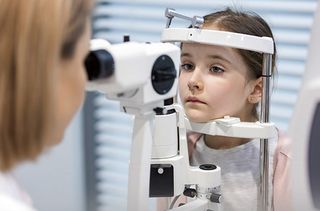Charity warns squint can be a symptom of eye cancer in children
Squinting can be a symptom of an aggressive eye cancer, according to a new survey – yet two out of three parents are unaware this could be affecting their children.

A squint can be a symptom of an aggressive eye cancer, according to a new survey – yet two out of three parents are unaware this could be affecting their children.
In a survey of more than 1,000 parents, commissioned by the Childhood Eye Cancer Trust and carried out by MMR Research last month, only 35 per cent identified a squint as one of the signs of retinoblastoma (Rb), a form of cancer that affects babies and children aged under six.
As this week marks World Retinoblastoma Awareness Week, The Childhood Eye Cancer Trust is urging parents to get their child's eyes checked out if they have a squint.
A squint, or turn in the eye as it is also known, is where the eyes point in different directions. It is the second most common symptom of retinoblastoma, after a white glow in a child's eye.
Last year nearly 40 per cent of children diagnosed with retinoblastoma had a squint.
Patrick Tonks, Chief Executive of the Childhood Eye Cancer Trust, said: ‘Around one child a week is diagnosed with retinoblastoma in the UK, or 50 a year, so it’s very rare and there is no reason for parents to be alarmed. In most cases a squint is completely harmless.

‘However we urge parents to have their child seen by a healthcare professional such as a GP or optician if they have a squint – or if they have any other concerns about their child’s eyes – just to rule out anything serious.’
GoodtoKnow Newsletter
Parenting advice, hot topics, best buys and family finance tips delivered straight to your inbox.
Over 90 per cent of children diagnosed with retinoblastoma will survive but more than half will lose an eye in order to stop the fast growing cancer spreading – early diagnosis is vital to save a child’s eyes, sight and life.
The poll also found that 66 per cent of parents with children aged six or under had never had their eyes checked and 51 per cent had never heard of retinoblastoma.
Patrick added: ‘Rb can be very difficult to detect because children often seem perfectly well and many parents and healthcare professionals have never heard of it. This week is World Retinoblastoma Awareness Week and we are urging all parents to be aware of the symptoms and to have their child checked out if they have any concerns at all.’
A Freelance Writer and Content Editor, Jenni has been working on the women's lifestyle team at TI-Media on and off for over three years. She writes about your favourite celebrities and TV shows so you never miss an update. Jenni also writes beauty news and features - so for all of your skincare and make-up needs, drop her a line.
-
 Top 20 rare baby names for 2024 revealed, with some celestial and regal entries
Top 20 rare baby names for 2024 revealed, with some celestial and regal entriesParents looking for rare baby names need look no further - these 20 monikers fit the bill for being unique while remaining suitably understated.
By Lucy Wigley Published
-
 Prince George is ‘a chip off the old block’ says body language expert as she highlights the similarities between him and his dad Prince William
Prince George is ‘a chip off the old block’ says body language expert as she highlights the similarities between him and his dad Prince WilliamThe father/son duo share an incredibly close bond
By Charlie Elizabeth Culverhouse Published